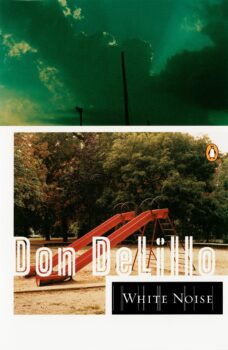This is one of the most unexpectedly enjoyable books I’ve read in the past 5 years or so. It’s just so entertaining and wonderful in its subtle humor and satire. It’s not in your face but will make you laugh out loud. As someone quite immersed in American culture, I find that nearly all the social and cultural criticisms made in this 1985 book is still very relevant today in 2022.
The main character of White Noise is Jack Gladney, a professor of Hitler Studies at a liberal arts college in the midwest. He lives with his wife Babbette and some of his children and stepchildren (they are both in their third or fourth marriages). This setting and cast of characters are absolutely perfect medium for DeLillo to satirize modern life (also while philosophizing).
The entire book is filled with extremely nuanced and hard-hitting observations and criticisms on modern life which are presented in a nonchalant manner, slipped into conversations and casual discussions.
Here are some examples of these types of passages that stuck out to me:
“The flow is constant,” Alfonse said. “Words, pictures, numbers, facts, graphics, statistics, specks, waves, particles, motes. Only a catastrophe gets our attention. We want them, we need them, we depend on them. As long as they happen somewhere else. This is where California comes in. Mud slides, brush fires, coastal erosion, earthquakes, mass killings, et cetera. We can relax and enjoy these disasters because in our hearts we feel that California deserves whatever it gets. Californians invented the concept of life-style. This alone warrants their doom.”
Cotsakis crushed a can of Diet Pepsi and threw it at a garbage pail.
“Japan is pretty good for disaster footage,” Alfonse said. “India remains largely untapped. They have tremendous potential with their famines, monsoons, religious strife, train wrecks, boat sinkings, et cetera. But their disasters tend to go unrecorded. Three lines in the newspaper. No film footage, no satellite hookup. – On natural disasters
Sometimes I bargain with myself. Would I be willing to accept sixty-five, Genghis Khan’s age on dying? Suleiman the Magnificent made it to seventy-six. That sounds all right, especially the way I feel now, but how will it sound when I’m seventy-three? It’s hard to imagine these men feeling sad about death. Attila the Hun died young. He was still in his forties. Did he feel sorry for himself, succumb to self-pity and depression? He was the King of the Huns, the Invader of Europe, the Scourge of God. I want to believe he lay in his tent, wrapped in animal skins, as in some internationally financed movie epic, and said brave cruel things to his aides and retainers. No weakening of the spirit. No sense of the irony of human existence, that we are the highest form of life on earth and yet ineffably sad because we know what no other animal knows, that we must die. Attila did not look through the opening in his tent and gesture at some lame dog standing at the edge of the fire waiting to be thrown a scrap of meat. – On death
If you’ve hesitated (or even avoided) picking up this book due to its reputation and have some preconceived notion of it being pretentious and therefore boring, I am telling you now that I too had the same reservations but this book is so profound (and absolutely hilarious) that you’ll have a great time reading it. Plus at 320 pages, this is tiny compared to other pseudo-intellectual postmodern “must reads” (I’m looking at you, David Foster Wallace and Jonathan Franzen).
Also, I just realized that Netflix is currently planning an adaptation of the movie starring Adam Driver and Greta Gerwig. I am very very excited!
